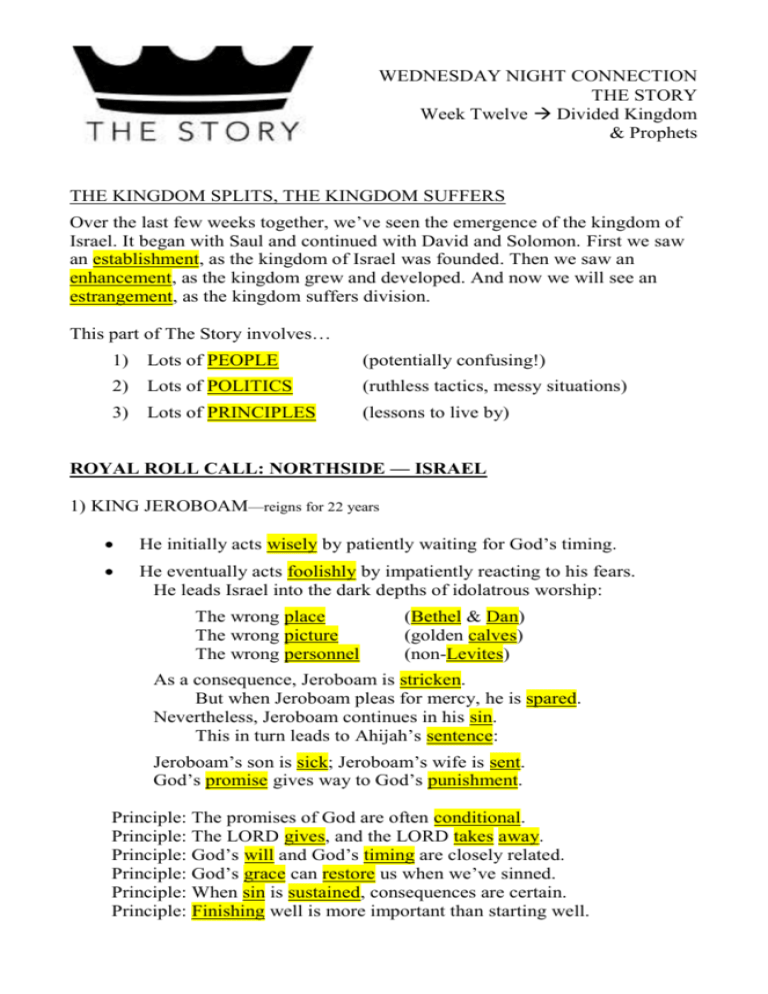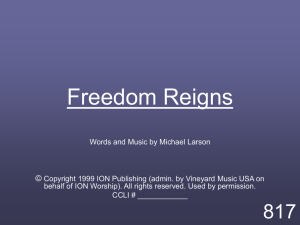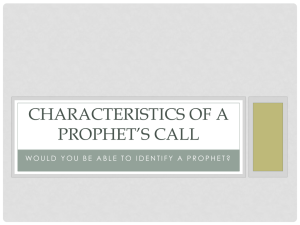You Can*t Tell Me What to Do!*
advertisement

WEDNESDAY NIGHT CONNECTION THE STORY Week Twelve Divided Kingdom & Prophets THE KINGDOM SPLITS, THE KINGDOM SUFFERS Over the last few weeks together, we’ve seen the emergence of the kingdom of Israel. It began with Saul and continued with David and Solomon. First we saw an establishment, as the kingdom of Israel was founded. Then we saw an enhancement, as the kingdom grew and developed. And now we will see an estrangement, as the kingdom suffers division. This part of The Story involves… 1) Lots of PEOPLE (potentially confusing!) 2) Lots of POLITICS (ruthless tactics, messy situations) 3) Lots of PRINCIPLES (lessons to live by) ROYAL ROLL CALL: NORTHSIDE — ISRAEL 1) KING JEROBOAM—reigns for 22 years He initially acts wisely by patiently waiting for God’s timing. He eventually acts foolishly by impatiently reacting to his fears. He leads Israel into the dark depths of idolatrous worship: The wrong place The wrong picture The wrong personnel (Bethel & Dan) (golden calves) (non-Levites) As a consequence, Jeroboam is stricken. But when Jeroboam pleas for mercy, he is spared. Nevertheless, Jeroboam continues in his sin. This in turn leads to Ahijah’s sentence: Jeroboam’s son is sick; Jeroboam’s wife is sent. God’s promise gives way to God’s punishment. Principle: The promises of God are often conditional. Principle: The LORD gives, and the LORD takes away. Principle: God’s will and God’s timing are closely related. Principle: God’s grace can restore us when we’ve sinned. Principle: When sin is sustained, consequences are certain. Principle: Finishing well is more important than starting well. 2) KING NADAB (son of Jeroboam)—reigns for 2 years He falls victim to an assassination plot. All of Nadab’s relatives suffer the same fate. 3) KING BAASHA—reigns for 24 years He is sentenced by the mouth of the prophet Jehu. It is the same sentence Ahijah pronounced on Jeroboam. Interestingly, he is punished for what God does through him! Principle: God uses the choices of people to achieve His own purposes. But people are still responsible for the choices that they make. (Man chooses; God uses.) Principle: Those who live by the sword die by the sword. Principle: History, if not learned from, repeats itself. 4) KING ELAH (son of Baasha)—reigns for 2 years He bears a “striking” resemblance to Nadab. (Both are struck down.) One is killed during a battle, the other during a binge. Principle: A drunk man is a vulnerable man. 5) KING ZIMRI—reigns for only 7 days!!! He is the first king to be indicted by people rather than prophet. Rather than face justice, he commits suicide. He literally burns the house down while he is still inside! 6) KING OMRI—reigns for 12 years He is the first king since Jeroboam to be selected by the people. He builds the city of Samaria. Principle: Every choice has consequences. 7) KING AHAB (son of Omri)—reigns for 22 years He is the most wicked Hebrew king until his time. (Compared to Ahab, Saul was not very bad at all!) He marries Jezebel, the Sidonian king’s daughter. Yet he is shown more grace than any other king! - visited by Elijah (whom he has tried to kill!) - helped by Jehoshaphat (who is a righteous king!) - spared by the LORD (which seems to involve a change of plan!) Principle: God pities the penitent, despite how bad they’ve been. Principle: A man’s wife will influence a man’s life! * QUEEN JEZEBEL (Ahab’s wife) She is a pagan princess. She practices and promotes idolatry and witchcraft. She murders innocent people. She murders inspired prophets. She is eventually killed to fulfill the LORD’s pronouncement. 8) KING AHAZIAH (son of Ahab) – reigns for 2 years He calls upon Baal-zebub rather than the LORD. Principle: Only the LORD can save. 9) KING JORAM (son of Ahab) – reigns for 12 years He finds favor through the prophet Elisha. He threatens to kill Elisha during a forced famine: An officer denies God’s oracle; some lepers get lucky. He is executed by King Jehu according to God’s command. Principle: God’s people should trust God even when times are hard. Principle: God’s people should not deny God’s power. Principle: God’s people should not keep the good news to themselves. 10) KING JEHU (grandson of Nimshi) – reigns for 28 years He is anointed king as a matter of delegation (1 Kings 19:16) He is commanded by God to destroy Ahab’s idolatrous legacy. Principle: God wants every trace of sin to be destroyed. 11) KING JEHOAHAZ (son of Jehu) – reigns for 17 years He is defeated repeatedly by Aram because of his sin. 12) KING JEHOASH (son of Jehoahaz) – reigns for 16 years He begins to recover territories lost to Aram. 13) KING JEROBOAM II (son of Jehoash) – reigns for 41 years He continues to recover territories lost to Aram. Principle: Sometimes, what has been lost can still be recovered. 14) KING ZECHARIAH (son of Jeroboam II) – reigns for 6 months He gets assassinated by Shallum. 15) KING SHALLUM – reigns for 1 month He gets assassinated by Menahem. 16) KING MENAHEM – reigns for 10 years He kills a city’s entire population rather graphically. 17) KING PEKAHIAH (son of Menahem) – reigns for 2 years He gets assassinated by Pekah. 18) KING PEKAH – reigns for 20 years He gets assassinated by Hoshea. 19) KING HOSHEA – reigns for 9 years He is the last king of the north… [cliffhanger] ROYAL ROLL CALL: SOUTHSIDE — JUDAH 1) KING REHOBOAM (son of Solomon)—reigns in Judah for 17 years He follows bad advice. He allows Asherah worship. He refuses to acknowledge his failure. Adoniram suffers for Rehoboam’s bad decision. Principle: Oftentimes, others suffer more for our mistakes than we do. 2) KING ABIJAM (son of Rehoboam)—reigns in Judah for 3 years He resembles his father. Yet he receives God’s favor. Principle: God’s favor is undeserved. 3) KING ASA (son of Abijam)—reigns in Judah for 41 years He is the first king to be compared to David. He destroys the idols that his ancestors made. He deposes his own grandmother for righteousness’ sake. But not so good, he employs Damascus against his own people. Principle: True devotion places God before everyone. (Luke 14:26) 4) KING JEHOSHAPHAT (son of Asa)—reigns for 25 years He becomes one of the most righteous kings to reign in Judah. He is the only king to actually make peace with Israel. He respects God’s prophets. (And they respect him.) 5) KING JEHORAM (son of Jehoshaphat) – reigns for 8 years He marries Ahab’s daughter and becomes as wicked as Ahab. 6) KING AHAZIAH (son of Jehoram and Athaliah) – reigns for 1 year He is probably named after his mother’s brother (Ahab’s son). He takes after Ahab’s family. (His mother is Ahab’s daughter.) He is executed by King Jehu according to the God’s command. 7) QUEEN ATHALIAH (daughter of Ahab) – reigns for 7 years She has all her grandsons killed! (…all except for one) 8) KING JOASH (son of Ahaziah, grandson of Athaliah) – reigns for 40 years He escapes his own grandmother’s assassination plot. He becomes king at age seven!!! He receives godly instruction from the priest Jehoiada. He repairs the LORD’s Temple. He eventually falls victim to an assassination plot. 9) KING AMAZIAH (son of Joash) – reigns 29 years He executes the officials who assassinated his father. He foolishly challenges Jehoash to battle and suffers royally for it. Like his father, he is plotted against and assassinated. Principle: Pride comes before a fall. 10) KING UZZIAH (son of Amaziah) – reigns for 52 years He lives in isolation as a leper until he dies. 11) KING JOTHAM (son of Uzziah) – reigns for 16 years He rebuilds the upper gate of the LORD’s Temple. 12) KING AHAZ (son of Jotham) – reigns for 16 years He sacrifices his own son in the fire. He builds an exact replica of Assyria’s altar. He makes unlawful alterations to the LORD’s Temple. 13) KING HEZEKIAH (son of Ahaz) – reigns for 29 years He is the second king to be compared to David. He destroys the bronze serpent that Moses made. He undergoes the greatest threat speech in Scripture. He responds with one of the greatest prayers in Scripture. He receives one of the greatest answers in Scripture. He receives another one of the greatest answers in Scripture! He makes one of the most epic errors in Scripture. He makes one of the most selfish statements in Scripture. 14) KING MANASSEH (son of Hezekiah) – reigns for 55 years!!! He is the wickedest Hebrew king ever!!! (worse than even Ahab) He leads the people to do more evil than even the pagan nations!!! Because of him, the LORD declares disaster upon Judah. 15) KING AMON (son of Manasseh) – reigns for 2 years He follows the example of his father. He is assassinated by the officials, but avenged by the people. 16) KING JOSIAH (son of Amon) – reigns for 31 years He is the third king of Judah to be compared to David. He becomes king at age eight. Like the other single digit aged king, he repairs the LORD’s Temple. While the Temple is being repaired, the Book of the Law is found. He leads the first and only nation-wide religious reform. He is killed in battle while boldly standing up to Pharoah Neco. 17) KING JEHOAHAZ (son of Josiah) – reigns for 3 months He returns to evil ways, even after his father’s reform!!! God’s promised judgment begins to unfold… [cliffhanger] WHAT’S IT MEAN? DIVISION PRECEDES DETERIORATION. Once division occurs, things progressively break down and fall apart. We see this not only in Israel’s history but also in America’s history: - Divided NATION – those who honor God’s truth and those who don’t Two critical realms: Two quotes to ponder: the courtroom & the classroom “One nation under God” “United we stand; divided we fall.” - Divided CHURCH – on both the larger level and the local level On the Larger level: Denominations (refusal to work together) On the Local level: Disagreements (failure to find consensus) - Divided HOMES – broken families resulting from divorce - Divided HEARTS – spiritual compromise leading to corruption Discussion Questions 1. Which form(s) of division above do you see/feel the most? How so? 2. What do you think can be done to combat these forms of division? WILL THE REAL PROPHETS PLEASE STAND UP? The prophets were those people through whom the words of God were spoken. They were the mouthpieces of God, and they came in all shapes and sizes. Some were old; others were young. Some were male; others were female. Some wrote books; others did not. But they all spoke from God. The problem was that not everyone who claimed to be a prophet was a prophet. There were as many false prophets as there were true ones. But God did not leave the people to guess. Here are a few of the things that verified that a prophet was truly sent from God: 1) SCRIPTURE 2) SINCERITY 3) SIGNS KEEPING THE KING IN CHECK: The kings provide an historical context for the prophets. The kings were the primary audience of the prophets. Ultimately, the prophets’ words applied to all the people, but they seem to have been especially directed toward kings. This is because the kings controlled the people. The old saying was very true: “As goes the king, so goes the nation.” Therefore, it is helpful to think of the prophets as referees (and also coaches) and the kings as players. The role of the prophet was to keep the king in check. Oftentimes, a “player” would be removed from “the game” entirely! Principle: Leaders should themselves be under leadership. To put it another way, no one is above the law—not even kings. WHAT’S IT MEAN? GOD IS ALWAYS SPEAKING. Through the Skies Through the Spirit Through the Sense (of right and wrong) Through the Scriptures - On the one hand, God speaks TO us—the unbeliever and the believer Words of Conviction Words of Comfort - On the other hand, God speaks THROUGH us. Every saint is a spokesman. Our Lives Our Love Our Lips WHAT GOD SAYS, GOD DOES. Everything the prophets predicted was fulfilled This is how we know that the Bible is fully reliable.









